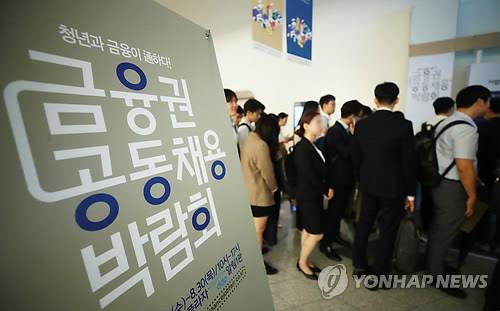The South Korean economy's ability to create new jobs has fallen to the lowest levels in over eight years, official data showed Sunday.
Data by the Bank of Korea and Statistics Korea revealed that the gross domestic product (GDP) elasticity of employment for Asia's fourth-largest economy reached 0.132 in the second quarter of this year. This reading is the lowest tallied since 0.074 in the first three months of 2010 and comes as the elasticity numbers stood at 0.356 in the fourth quarter of last year and fell to 0.252 in the first three months of 2018.
The GDP elasticity of employment, which shows how many jobs are created for industrial sector growth, is calculated by dividing on-year growth in job creation with the real economic growth rate during a set period of time. Higher numbers represent more employment vis-a-vis industrial growth, while lower figures are signs that fewer openings are available despite gains.
The data showed South Korea elasticity on an annual basis on a generally downward trend falling from 0.699 in 2014 to 0.395 in 2015 and 0.309 in 2016, although it rose to 0.400 last year.
For the first half, the reading hit 0.192, with the numbers likely to reach the lowest in recent memory.
The BOK and the statistics office said the reason for the weakening of employment is due in part to South Korea's growth being centered on industries that are highly automated and do not require a lot of workers.
The country's growth in recent years has been in semiconductors and petrochemicals that are facility or process intensive. They have contributed greatly to the GDP but are less helpful in terms of employment. In contrast, relatively labor intensive sectors like construction, autos, accommodations and hospitality have struggled with sluggish or even negative growth.
Related to the current situation, Kim Hyeon-wook, an analyst at the state-run Korea Development Institute, said there is a need for the country to move toward greater labor market flexibility with the state supporting efforts by firms to hire new people and by expanding the country's social security infrastructure.

"There is a considerable amount of labor rigidity, especially in big companies with strong unions," he pointed out.
Others said that in order for South Korea to escape the condition of growth not being accompanied by the creation of jobs, the country must move away from exports and actively build up the domestic economy.
Joo Won, senior research fellow at Hyundai Research Institute, claimed that with manufacturing reaching its limit, Seoul needs to move toward the service sector through reforms centered on the easing of red tape.
"There is a need to pass reformist legislation that can breathe new life into the service sector," the economist said. (yonhap)

